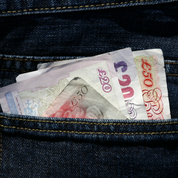Social Worlds in 100 Objects, Themes and Ideas
The banknote: a symbol of trust?
A fistful of cash opens the door to a shopper’s paradise - but what really gives those slips of paper in your hand their value? Social scientist Dr Jane Nolan observes that a little trust goes a long way.
Banknotes are the most direct way of paying for purchases. Unlike the cheque or credit cards, no third party needs to be involved. Simple? Only if there is faith in the currency you are offering.
There is a written promise on a £20 note “to pay the bearer twenty pounds”, yet the actual value of a banknote rests on what other people are prepared to give for it. Indeed, if we reflect on our experience of foreign travel - or the ups and downs of house prices - we can see how the value of £20 can vary dramatically.
What social scientists find interesting about a banknote is that it symbolizes the trust people have in financial institutions. When we accept banknotes, we trust that the Bank of England will not go bust and that we won’t lose out on the notes being a “store of value”. Equally, banks trust that they won’t lose out when they hold cash for us to withdraw. This type of trust is true for money more generally - whether that value is written on paper, or displayed on an LCD screen.
But it is very different to the trust we invest in banks when we leave deposits with them. Or, that banks have in us, when they honour cheques or direct debits drawn from empty accounts. We expect to be able to withdraw on demand and the bank expects us to pay back our overdraft in the future. This kind of trust involves good social relations between the borrower and the lender, the debtor and the creditor.
And it happens on a global scale. The biggest foreign owner of US debt is China, which currently owns around $800 billion dollars of treasury bills and bonds. My research underlines how this apparent shift in global economic power from West to East is facilitated by a very special form of social relationship. Western banks offer expertise in risk management systems, corporate governance and financial products such as credit cards and mortgages. Chinese banks, in return, offer Western partners access to their retail branch networks and millions of new customers.
Despite these ‘win win’ scenarios, my findings show that co-operation has proved complicated and difficult. A key problem is trust. Western managers perceive the regulatory environment in China to be biased against them. Chinese executives were disappointed by the conduct of western banks during the 2008 financial crisis; this major event reignited doubts about the trustworthiness of Western firms and managers.
Trust is defined in lots of ways in the social sciences, but, as far as institutions are concerned, esteem and credibility are essential to building a reputation. Lose your reputation and you lose the trust of your partners and clients. Lose your partners and clients and you lose your capacity to make valuable economic exchanges. This is the case whether we discuss the social relations that underpin banknotes or cooperation between nations and global elites. Money systems work well only if people and institutions enjoy good social relations of trust in each other.
Dr Jane Nolan
Research interests
- The role of western bankers in the reform of financial institutions in mainland China
- Supervision Interests:
- The sociological study of finance and banking
- China
- Economic and organisational sociology
- International human resource management
- Transnational and national business networks
- Corporate governance and corporate social responsibility
- Globalisation and institutional change
Contact details
- jn130@le.ac.uk
- 0116 252 5977